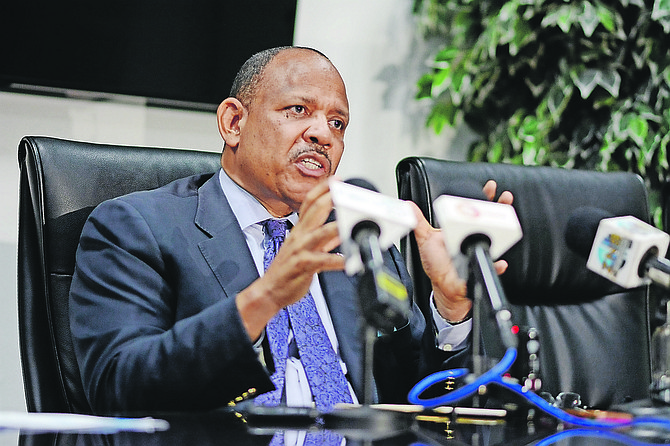By MORGAN ADDERLEY
Tribune Staff Reporter
A COUNCIL is being established to address the issue of problem gambling in The Bahamas, Health Minister Dr Duane Sands announced yesterday.
The council is anticipated to have a budget of $1m, Bahamas Gaming Operators Association CEO Gershan Major added.
Yesterday, a gambling addiction seminar was held at the Public Hospitals Authority. Both Dr Sands and Mr Major spoke at the event.
Dr Sands described the problem of gambling as an “emerging public health challenge,” adding the American Psychiatric Association has recently classified this issue as an official disorder.
He noted the APA suggests that problem gambling shares similar hallucinogenic characteristics with substance disorders such as cocaine and heroin abuse.
He added his ministry is creating a model of care that works in the local context.
“In charting a course for treatment and recovery of problem gambling in the Bahamas, one such evidence-based practice worthy of examination by all stakeholders is the establishment of a jurisdictional council on problem gaming or gambling for the Bahamas,” he said.
He noted international councils or comparable organisations already exist world-over, and have “strategic responsibility for problem gambling awareness, prevention, treatment and recovery, research, along with policy development, designed to impact persons and their families affected by problem gambling.”
“It is abundantly clear that this forum is the right approach to chart a sustainable course with meaningful resources, inclusive of a functional administrative and clinical team,” Dr Sands continued.
“It is not lost on me that this will require (a) substantial perpetual budget if we are truly going to address the issue of problem gambling and those affected by this phenomenon.”
Dr Sands provided reporters with more details on this council and its budget following these remarks, noting the “proliferation of gaming institutions” throughout the country.
“But what we have seen has also been a small percentage of individuals that have a serious problem controlling their gaming,” he continued. “So they spend their mortgage, they spend their children’s school fees, grocery money, et cetera, on gambling. It is a serious mental illness and it is impacting the quality of lives not only of people, but also their families, their kids.
“So we have had to modify our approach to incorporate the management of this new ailment into our mental health programmes.
“Now, in terms of the budget, the gaming houses are supposed to set aside a certain amount of money every year for this problem. And I want to find out exactly how much they’ve set aside, I’ve heard the figure $1m, and we now need to know how that money is being spent. Certainly from the Ministry of Health, it’s all a part of our PHA budget,” Dr Sands said.
When he spoke to reporters, Mr Major said the Bahamas Gaming Operators Association had allocated about $1m for a responsible gaming initiative.
“Due to the challenging discussions around the tax matters that related to our industry we had to refocus somewhat those allocations,” he said. “Now that that matter is settled, we are now back to 2019 with the new budget being currently revisited. So I won’t be able to give you the specific number, but it’s going to be somewhere (around) that or a bit more.
“And the purpose of the budget is to educate the public, create awareness, find opportunities to build capacity with our partners at Sandilands Rehabilitation, the (PHA), the Grand Bahama Health Services, as well as create an area for treatment, counselling, and support for persons who are most at risk or who find themselves and their family members challenged.”
Mr Major also noted in his remarks that five addiction specialists at Sandilands have been chosen to become internationally certified in gambling disorders— a rarity in the Caribbean region.

